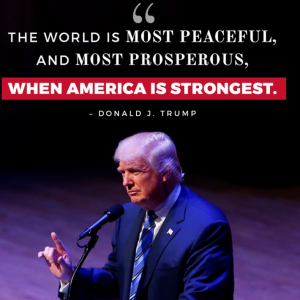A nation must think before it acts.
The Moshe Dayan Center
Tel Aviv University
In the immediate aftermath of Donald J. Trump’s victory in the U.S. presidential election, Abdulkhaleq Abdullah, the Emirati chairman of the Arab Council for Social Sciences, wrote that the last thing the world needed was a “huge dose of uncertainty” that would only add confusion to the already muddled state of global politics.[1] Joyce Karam, the Washington Bureau chief for al-Hayat, pointed out that “unpredictability” and “lack of coherent foreign policy” define Trump’s approach to the Middle East.[2]Nevertheless, it is still too early to be definitive about how Trump will leave his mark on U.S. policy in the Middle East. Politics are reactive, and Trump will undoubtedly be confronted with new circumstances that will present unforeseen constraints and opportunities. Indeed, one of the principal critiques of President Obama’s Middle East policy has been its apparent lack of coherence, with many arguing that Obama intentionally eschewed a grand unifying principle. Ironically, then, Trump’s approach may ultimately demonstrate as much continuity as change in the Middle East, illustrating, that “far from being captain of the team, a president is often captive of his team and the world as he finds it.”[3] In other words, Trump will inherit the playing field left to him by President Obama.
And yet Trump’s victory suggests that populism may be remaking politics in the West.[4] The European Union is not a likely alternative to U.S. leadership, not only because it does not possess the capabilities to project power in the region, but also because it is experiencing its own populist backlash — in response to the shock of the Syrian refugee crisis — that may preclude it from deeper engagement in the Middle East. Beyond the Middle East, Trump’s brand of populism rejects the post-Cold War expansion of free-trade and globalization as well as the burden of leading a liberal international order.[5] In the wake of Brexit during the summer of 2016, Trump’s election portends “the globalization of anti-globalization.”[6]
The United States’ Middle East policy, therefore, is likely to be a byproduct of President-elect Trump’s attempt to put “America first” and reduce American commitments abroad in the name of strengthening the U.S. at home. President Obama also tried to reduce the amount of U.S. blood and treasure it committed to the Middle East, but with mixed results. For example, since August 8, 2014, the U.S. has spent more than $9 billion on operations against the Islamic State (IS), which tallies to more than $12 million per day.[7] The war against the Islamic State is likely to be a source of continuity between the Obama and Trump administrations. However, while President Obama was often critical of Middle East allies that he felt did not reflect core U.S. liberal values, President-elect Trump has expressed admiration for illiberal, authoritarian rulers in the Middle East, who insist that they reflect the “will of the people,” just as Trump does. Indeed, President-elect Trump may attempt to reduce U.S. burdens by uncritically outsourcing the war against terror to such partners. In fact, no less than Bashar al-Asad, declared President-elect Trump a “natural ally” in the fight against terrorism.[8]…
Continue reading “President-elect Trump and the Middle East?”
[1] Abdulkhaleq Abdullah, “An open letter to the 45th president of the US,” Gulf News, November 9, 2016.
[2] Joyce Karam, “Trump and the Middle East: ‘Ignore the Campaign Rhetoric,’”al Arabiya, November 10, 2016.
[3] James J. Zogby, “What will Trump do?” Jordan Times, November 21, 2016.
[4] Pippa Norris, “It’s not just Trump. Authoritarian populism is rising across the West. Here’s why,” The Washington Post, March 11, 2016.
[5] “Trump Announces Policy Plans,” The New York Times, November 21, 2016.
[6] Timothy Garton Ash, “Pushing back against populism,” The Globe and Mail, November 12, 2016; Pippa Norris, “It’s not just Trump. Authoritarian populism is rising across the West. Here’s why,” The Washington Post, March 11, 2016.
[7] U.S. Department of Defense, Operation Inherent Resolve, August 14, 2016.
[8] Helene Cooper and Eric Schmitt, “Syrian President Calls Donald Trump a ‘Natural Ally’ in Fight Against Terrorism,” The New York Times, November 16, 2016.




